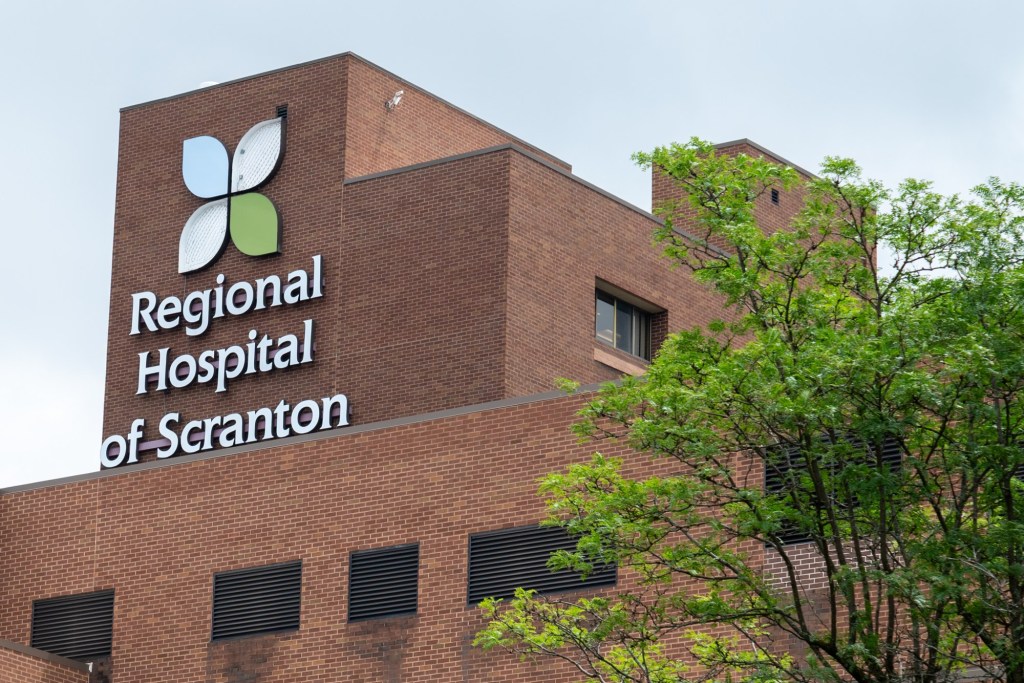SCRANTON — An agreement by Tenor Health Foundation to purchase Commonwealth Health’s hospitals in Scranton and Wilkes-Barre appeared at hand Friday, with one official saying the agreement was signed and another saying it was “very, very close.”
U.S. Rep. Rob Bresnahan, R-8, Dallas Twp. said the deal between the nonprofit Tenor and for-profit Community Health Systems Inc., Commonwealth’s Tennessee-based parent company, could be finalized Friday, followed by a 30-day process to complete the sale of Regional Hospital of Scranton, its Moses Taylor Hospital campus and Wilkes-Barre General Hospital.
Scranton Mayor Paige Gebhardt Cognetti said later Friday that she heard Tenor and CHS had signed a purchase agreement for the three hospitals. Cognetti is seeking the Democratic nomination to challenge Bresnahan for the 8th Congressional District seat in next year’s midterm elections.
Efforts to confirm the potential purchase agreement with Tenor officials were not immediately successful Friday.
Bresnahan disclosed the information during a roundtable with Maternal and Family Health Services employees and board members at the organization’s Family Health Services Circle of Care center in South Scranton. Bresnahan was at the nonprofit’s facility to discuss funding for the Special Supplemental Nutrition Program for Women, Infants and Children, or WIC.
Tenor signed a letter of intent to acquire the hospitals in August after their sale to another nonprofit fell through last year. WoodBridge Healthcare had announced plans to purchase the hospitals in July 2024, but the deal fell apart in November when WoodBridge failed to secure bond financing to complete the acquisition.
The potential sale to WoodBridge, and its collapse, prompted fears that the financially challenged Scranton hospitals could close absent acquisition by another buyer, creating a void in the region’s health care landscape that other providers would struggle to fill.
Those fears motivated a multifront effort to save Regional and Moses Taylor, with officials at all levels of government working to facilitate a new sale and a collection of foundations and nonprofits providing millions of dollars in temporary stopgap support to keep services running and staff paid at the Scranton facilities in the intervening time.
Bresnahan asked Maternal and Family Health Services officials about their relationship with local hospitals during the roundtable. MFHS President and CEO Maria Montoro Edwards responded the organization was “very worried” about Moses Taylor, where she said most babies in the area are born.
“We are very worried about (the hospitals) closing because it would be a very difficult time for patients to get somewhere else,” she said.
Edwards said many clients are choosing to deliver outside of the system where they receive prenatal care. Thirteen of their clients have delivered outside of the Commonwealth Health system.
She said she is grateful for the foundations that have been financially supporting the hospitals, which would normally donate to nonprofit organizations like MFHS. The foundations and nonprofits that have provided millions in temporary financial support since the spring to help ensure operations continue at Regional and Moses Taylor include the Scranton Area Community Foundation, the AllOne Foundation, the Luzerne Foundation, the Moses Taylor Foundation and the NEPA Health Care Foundation, as well as the Wright Center, Allied Services and the Greater Scranton Chamber of Commerce.
Support for WIC
During his visit, Bresnahan emphasized his support for WIC, which provides nutrition assistance to women who are pregnant and women and children under the age of 5. Officials gave the congressman a tour of the facility. He said he is concerned about federal funding for the program collapsing amid the government shutdown, which is in its fourth week.
The program, which helps more than 6 million low-income mothers, young children and expectant parents purchase nutritious staples like fruits and vegetables, low-fat milk and infant formula, was at risk of running out of money this month because of the government shutdown, which occurred right before it was slated to receive its annual appropriation.
The National WIC Association is calling for an additional $300 million in funding for the program, warning that millions of families could lose access to WIC benefits as early as Nov. 1.
Edwards said the organization is concerned about the federal government continuing to fund the program.
“We are very concerned because that’s about half of our budget and it is the most vulnerable of the people we serve,” she said.
Edwards was encouraged by Bresnahan’s visit Friday.
“I feel like he does believe this is a very pivotal issue and that it should be bipartisan and that he’s really willing to take this conversation to Washington and work towards getting a solution,” she said.
Staff Writer Jeff Horvath contributed to this story.
Originally Published: October 24, 2025 at 5:08 PM EDT

